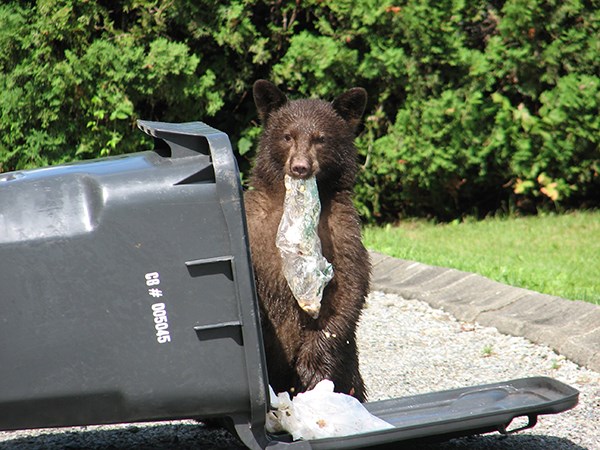Warm weather is bringing Squamish bears out of hibernation earlier than usual. A bear in Garibaldi Highlands has been active since mid-January and already gained access to two freezers that were on back decks.
Scat with birdseed and a plastic bag were evidence of the non-natural food on which this bear has been foraging.
Typically, bears emerge from their dens sometime in March to early April. Moms with cubs are the last to make their way out, giving the cubs the extra time to nurse and grow.
During hibernation, bears do not eat or drink. The calories they consume during the spring, summer and fall are what see them through the winter as they burn fat, not muscle, to survive. This is why bears capitalize on any and all sources of calories while they are awake; their winter survival depends on good feeding and a burgeoning waistline. Bears can lose one third of their weight during the winter and often continue to lose weight well into June, leaving only one thing on their minds when they emerge from their dens: food.
The unseasonably warm weather is resulting in early skunk cabbage shoots, fresh new grasses, buds and catkins, all early springtime food for the local bruins. To keep the community safe and keep the wildlife wild, local people need to take steps to reduce wildlife attractants around houses. Garbage totes must always be secured with both locks at all times and should only be unlocked when placed at the curb on the morning of collection. Putting garbage out the night before collection is a direct invitation for bears and other wildlife to enter our neighbourhoods for non-natural food. Bird feeders must be strung up and out of reach, and seeds must not gather on the ground as this will attract rodents which are prey for bears, cougars, bobcat and coyotes. Fridges and freezers must be locked or moved inside, and pets should be fed indoors.
Squamish received Bear Smart accreditation from the Ministry of Environment in 2010. This was in recognition of the tremendous efforts the municipality and community have made, and continue to make, towards reducing human-bear conflicts.
For more information on Squamish wildlife, email [email protected]; to report a possible Wildlife Attractant Bylaw infraction, email [email protected]; and to report a wildlife encounter, call 1-877-952-7277.
Meg Toom is the Squamish WildSafeBC community coordinator.



